What Happens When You Teach a Cowboy to Sail
Can a relationship survive a grand adventure? That’s a question neither partner thought to ask when She got the bright idea to refit an old sailboat while He was dreaming of life on the range. A he-said-she-said tale of a voyage that somehow managed to avoid the rocks.
New perk: Easily find new routes and hidden gems, upcoming running events, and more near you. Your weekly Local Running Newsletter has everything you need to lace up! .
She Said… “I Dream About Blue Seas”
In 1983, my parents decided to go into the boat business. They bought a small boatyard near our home in Stamford, Connecticut, and imported Westerly sailboats from Hampshire, England. The first to arrive was a Westerly Fulmar, a 32-foot sloop we named Lower Goose, after an island in Maine we often visited. She was quickly sold.
Twenty-eight years later, my father bought Lower Goose back. As she was being refitted, a space heater started a fire down below that smoldered for half a day. Lower Goose became an insurance write-off, but my dad couldn’t bring himself to scrap her. For the next few years, she hung neglected on a mooring in Connecticut’s Five Mile River.
I have spent some time on boats. There were the childhood boat shows, family sailing trips, and my youthful obedience to a call of the sea so loud that I dropped out of college and signed on as a hostie, a volunteer who cooks and cleans in exchange for board, on a boat bound for the Coral Sea, in the South Pacific.
Will, my boyfriend, is a writer who grew up in Colorado. He is happiest on a horse and hunting in the mountains. His calls come from the Mongolian plains and Asia’s Silk Road. But I was certain that his love of open spaces, wind patterns, and rope knots would recommend him as a sailor.
We had both lived in Santa Fe for years when we met on horseback while riding on a mutual acquaintance’s ranch. The first time we spent any length of time together was five years ago, on one of Will’s story assignments, mining for gold in Arizona. As a physician assistant, I was hired to keep the subject of his story, an aging prospector, alive while we trekked through the mountains. Will was not his usual self, and we quarreled terribly. As far as I was concerned, we still weren’t on speaking terms when, about a year later, back in New Mexico, I got a flat tire one night and reflexively called the most capable person I knew. Will promptly turned up in his truck full of tools and swapped out the tire while chatting amiably about the weather. We’ve been talking about the weather ever since.
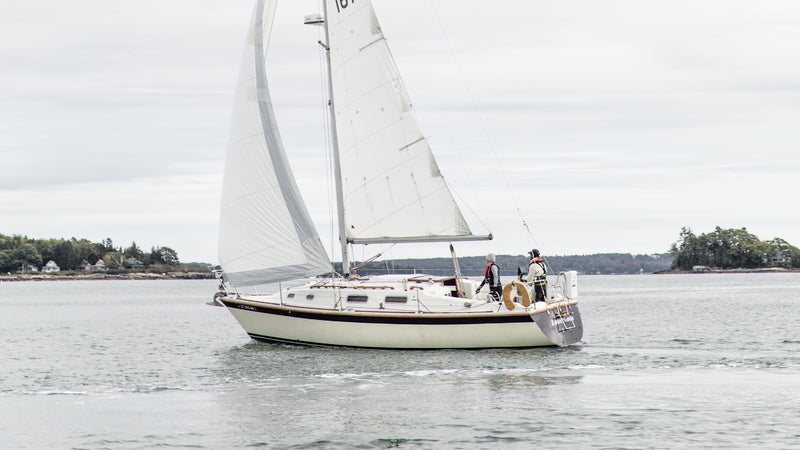
As time went by and Will spoke about dreams of a future homestead together, I’d counter with my own, filled with endless seas. When he suggested we get goats, I said I think we should have a boat.
“W���������,” said Will, which is what he says when he’s thinking.
It wasn’t long before we were enrolled in a week of sailing school—and I’d asked my father if we could have Lower Goose.
“Don’t be ridiculous,” he responded. “Have you seen the state of the boat? Besides, you live in New Mexico.”
But Will and my father are pretty easy to capture with the idea of an adventure.
In April 2016, my dad signed over the boat to us. I started a to-do list that quickly grew to six pages. That was the summer of Tyvek suits and respirators, grinding the iron keel, and sanding, scrubbing, and painting in Connecticut’s 90-degree heat. My fingernails turned blue from scraping old paint. My mother worried that we were poisoning ourselves. Tensions ran high. For $50, we got a leaky old inflatable dinghy and named it Pato. Will bought a splicing kit, joined a Finnish knot group, and rerigged the lines on Lower Goose.
In July 2017, we rode horses across Wyoming, reconnaissance for a book Will is writing on the Pony Express trail. It was very windy, but there isn’t much sailing there.
Our goal was to have Lower Goose ready for an overnight trip by the end of summer 2018. But I got carried away one night and suggested we sail her from Connecticut to Lower Goose Island, in Maine’s Casco Bay. Will thought this was a grand idea. We mapped out a leisurely week sailing north, stopping each night at a different harbor.
He Said… “I Thought Your Sailing Bug Would Only Last a Week”
I’m a mountain man. Always have been. My legs are pale as fresh snow, and my farmer-tanned neck is red year-round. But Claire’s idea of a vacation, at least as it emerged on a midwinter night at our home in the southwestern desert, was to take a seven-day sailing course in the Caribbean.
“You can choose the next vacation,” she said. “I think you’ll like sailing.” And so, for fear that saying no might run her off, I said yes.
On the first day of sailing school, I dropped a semi-critical piece of equipment overboard. I remember Skipper Dan, our instructor, saying at dawn on the third day that I probably wouldn’t pass the three exams by week’s end. On the fifth day, I whispered to Claire that I knew more knots than Skipper Dan and would gladly go knot for knot with him any day of the week.
“What the hell does that mean,” Claire said. “You need to chill out.”
On the sixth day, when Claire and the other couple in our class went ashore for provisions, I was left behind with Skipper Dan to fill the water tank. “You’ve found your new calling,” he said, standing over me.
This son of a bitch takes me for a common laborer, I groused. I asked him if he meant that my new calling was holding a garden hose over a hole in the side of a boat.
“No, sailing,” he said. I told him we’d see about that.
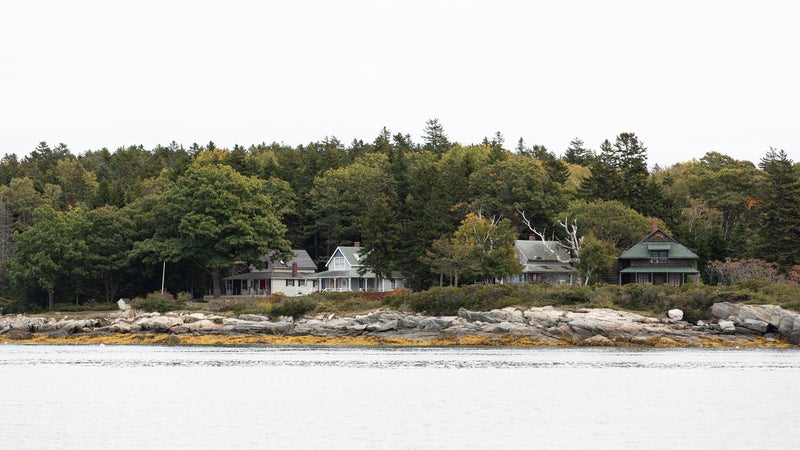
At week’s end, Skipper Dan congratulated us for passing the exams and told me that he hoped I would continue to sail. I flew home to New Mexico to resume life on dry land, while Claire flew to Connecticut to see her parents. Soon enough, she called excitedly to tell me about Lower Goose.
“This is our chance to own a boat,” she said. “And if we fix her up but don’t want to sail anymore, we can always sell her.”
In the fog of love, I failed to fully think through what exactly this would entail. I supported her. What the hell, I thought, at least we’re out from under Skipper Dan. Never mind that we lived in New Mexico and Goose was in Connecticut. That summer we headed east, rolled up our sleeves, dove in.
We were like untrained cattle dogs: eager to work but without direction. We hardly knew where to start. Fortunately for us, one of Claire’s old boyfriends ran a sailboat-maintenance business in nearby Norwalk. Max, I was told, was a professional sailor, had crewed on boats all over the world, and had under his care a carbon-fiber-hulled racing boat with its own Facebook page. “He was sponsored by Omega when we lived in his grandmother’s flat in Vienna,” Claire said.
A member of an Omega-sponsored sailing team with a flat in Vienna wouldn’t have been my first choice of someone to partner with, and being an old boyfriend of Claire’s made him pretty much my last. At times I suspected that he piled on the work to watch us suffer. I had no way of knowing whether our rudder needed as many coats of epoxy as he suggested. Was it truly necessary for us to grind every last square millimeter of old paint from the keel before repainting it? Did the undersides of the floorboards really need several layers of the most expensive varnish you can buy? But as it turned out, Max continually saved our asses.
She Said… “Your Mind Is in Central Asia”
We planned to depart for Maine on September 1 and needed all our free time to ensure that Goose was safe and habitable. But in July, Will was offered a place on the U.S. kok boru team participating in the World Nomad Games—in Kyrgyzstan. This meant that, during crucial pre-cruise preparations, he would be halfway around the world playing a game where men on horses fight over a headless goat. His return date was September 10, which conflicted with our departure. I was not pleased. Alone, I reviewed my checklist: Get plumbing. Get electricity. Fix bilges. Put in a head. Redo the galley.
I called Max. “Haul the boat,” he said. Goose was put back on the hard. I crossed all nonessential projects off the list. The galley was beyond repair; we would make do with a camp stove. The guys at the yard took over the more difficult tasks, like hooking up the head and the waste-holding tank, while I painted the cabin and ordered carpet to cover the soot in the V-berth. I also got wire crimpers and a book on volts and ohms before it struck me as irresponsible to electrocute myself prior to the journey. So I hired Bogdan, a marine electrician, to rewire the boat.
Will had ordered 15 pounds of New England nautical charts before setting off for Kyrgyzstan, and once I got back to Santa Fe, I spread them out, each as large as a couch cushion, on our kitchen table. There were lots of symbols. I added “study navigation” to my list. But I was also confident that Will could navigate us out of a black hole if it came to that. My father is in general impressed by Will, but after I sent him a photo of our paper charts, he made an urgent call to suggest that we get ourselves a digital chart plotter.
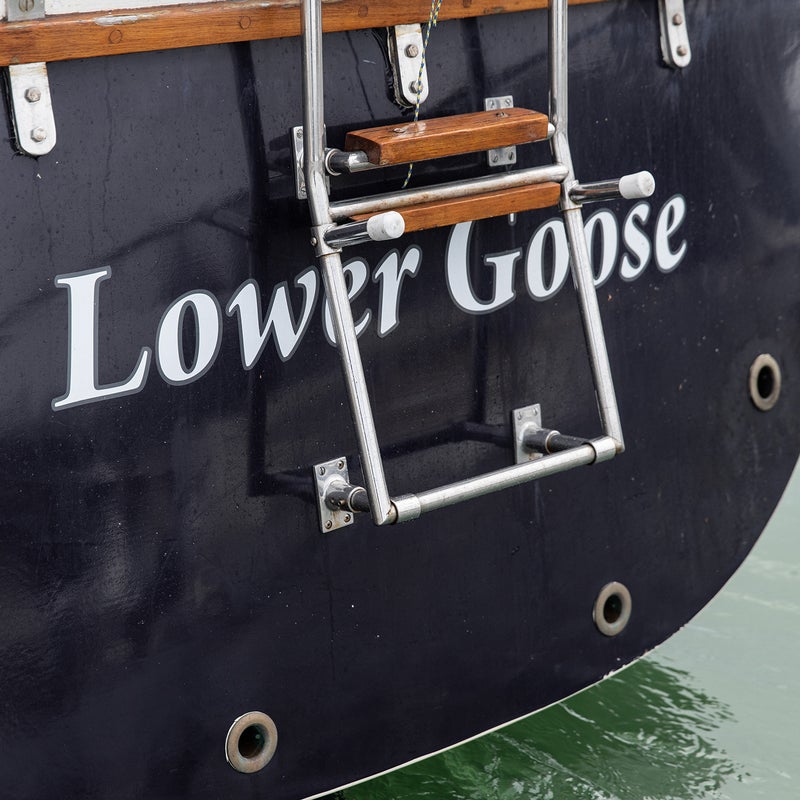
Right, I replied. My dad asked for Bogdan’s phone number, and between the two of them they equipped Goose with a Garmin chart plotter and radar combo, a VHF radio, a distress beacon, an anemometer capable of measuring both true and apparent wind velocity, and another instrument that could clock speed over ground and through the water. She’s a Hinckley undercover, Bogdan said, citing a much fancier boat. Still, I plotted a tentative course to Maine that would keep us mostly within cellular range.
On September 10, after 48 hours of travel, Will arrived home—sick. For the first time since I have known him, he was unable to get out of bed to feed the horses. He claimed to have been peeing blood in Kyrgyzstan, after a hard fall playing kok boru. He was certainly coughing up the stuff. “You’re ruining the pillowcases,” I scolded, perched on the edge of the bed trying to show him my new apps, Navionics and PredictWind. He made noises like a dying seal. I laid his sailing clothes next to the bed. “Winter will not wait for us!” I shouted in his sweaty ear.
Five days later, with Will still looking rather pallid, we flew east in the wake of Hurricane Florence. We waited out the worst of the storm and chose Sunday, September 23, for our new departure date. In preparation, I started reading the .
He Said… “I Showed Up Despite Being Wrecked”
Thick clouds hung low over the steel gray water of Long Island Sound as Claire’s parents and her younger brother, James, and his family showed up at the dock to see us off. We sprayed champagne over the anchor, everyone in good spirits despite unseasonably cold weather. Claire’s dad pointed out that our anchor setup lacked a swivel shackle and chain. Yep, I told him, got that chain and swivel right here in the starboard locker.
“We should be in Maine in a week’s time,” I said as we cast off our dock lines and cranked the old Volvo Penta diesel motor to life. Lower Goose runs like a mustang when she’s in front of a breeze; under motor power, she lumbers along like a team of draft horses hitched to an ice cart. But given the tight confines of the dock and our lack of experience, we motored into the sound, passing dangerously shallow water near the Greens Ledge lighthouse before running up our sails for an easterly wind. Claire’s family, who had followed us out in another boat, gave us the thumbs-up and swung for home, and we were finally on our own, headed for new water.
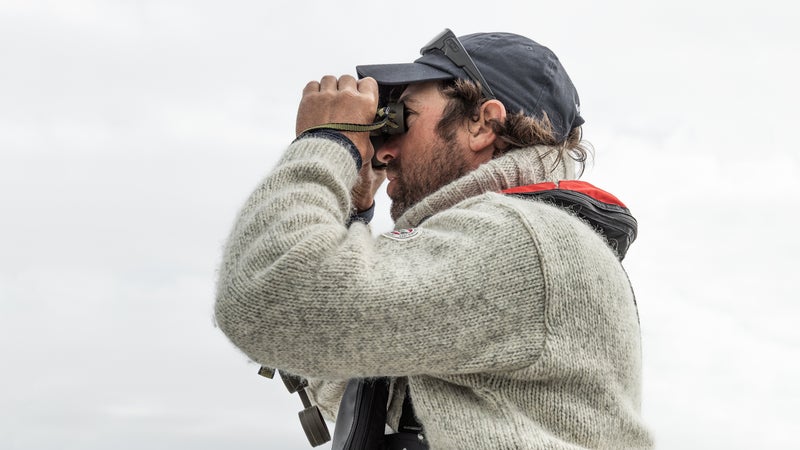
After two hours underway, we’d polished off a can of Pringles and slightly interfered with a massive trash barge. Claire was at the helm when we received a text from her brother, who was looking at photos of the launch and wondered: “Is your outhaul connected? Maybe tighten it up a little bit?”
Claire and I looked at each other. The outhaul? We knew that we had an outhaul—the line that keeps the outer corner of the mainsail tight—and we thought that it was indeed tight. But we’d certainly never adjusted it.
“Hmmmm,” I texted back. “Talking about outhaul. Just finished a can of Pringles.”
Our learning curve was steep, but morale was high. Claire, whose three summers of effort had now resulted in us making a crisp five knots on a starboard tack, glowed with an earned sense of accomplishment.
That night we docked at the Milford Yacht Club and enjoyed a mediocre dinner in front of a mediocre Frank Sinatra tribute band. The next morning, I checked the forecast using a series of apps on my phone. The National Weather Service had issued a small-craft advisory: wind speeds of 25 to 33 knots, seas five feet or more.
“Inexperienced mariners, especially those operating smaller vessels,” the official warning said, as if targeting us directly, “should avoid navigating in these conditions.”
Claire prefers to start her day slowly, taking a half-hour or so to gather her thoughts. It’s generally unwise for me to read her news headlines or talk about the day’s itinerary before the kettle has boiled a second time. But I told her anyway: small-craft advisory for the sound today.
From beneath the piled sleeping bags and blankets in our berth came no response. So I checked the fuel, oil, and coolant levels, boiled the kettle a second time, and made for the churning sea.
As it turned out, small-craft advisories were issued on more than half the days we sailed. Claire, however, later informed me that she had no idea of this until after the journey. (“You know that you can’t tell me anything until after I’ve finished my tea,” she said.)
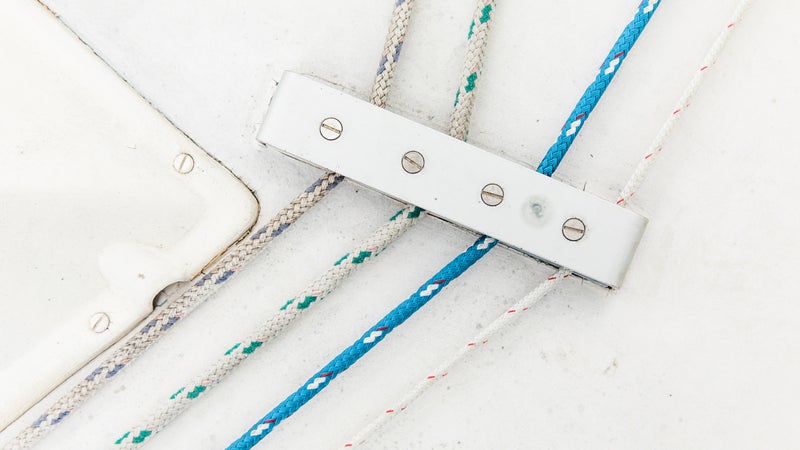
For the next three days of passage along the coast—to Old Saybrook, Stonington, Point Judith—the weather worsened. We were behind schedule, and it frustrated me. I asked Claire if she thought we’d get to Maine in time for Thanksgiving. “We have to start out earlier every day,” I told her.
“That’s your opinion,” she said.
“Everyone knows that when you’re traveling you need to make use of daylight,” I said.
“That’s how you feel about it,” she replied. “But not everyone feels that way.”
Two days of near silence ensued. We limited communication to what was necessary to sail the boat. I longed for our horses and dog back in New Mexico and figured that they were enjoying a sunny autumn in the mountains while we slowly froze to death on a boat in New England.
She Said… “A Bird Nearly Got Us Killed”
On the sixth afternoon, the sun came out and we were back to chattering away like forest animals. Will sang, “Makes me want to move my dancing feet,” his own lyrics to a Bob Marley song. It was uplifting to see other boats with their sails up. We hit seven knots.
It’s remarkable, the effect that sunshine and conviviality have on confidence. We set a course for Cuttyhunk Island, off Massachusetts, where after we picked up a mooring in the bay, some entrepreneurially minded kids on a small boat delivered salty sea-cold oysters and hot creamy chowder for dinner. Then I reorganized our books. Lower Goose might not have hot water—or even running water—but she has an extensive library, thanks to a yacht-club sale Will and I attended. We bought every book available, each for a dollar, including a first edition of the Joshua Slocum classic .
The next morning, we zipped across Buzzards Bay to New Bedford so Will could visit the Clifford Ashley knot exhibit, something he’d been droning on about for almost a year. Then we raced into Marion, screeching and beaming as we hauled the sails in closer and closer, trying to overtake the boat in front of us, until I shouted to Will, “We’re going to hit it!” He turned Goose to wind in the narrow channel, and we doused our sails.
A day later, we timed our cruise through the Cape Cod Canal to start with the early flood tide and eventually entered the Atlantic Ocean proper. When a sudden squall hit, Will caved to my insistence that we duck into Plymouth Harbor. We somehow missed the famous rock but read inscriptions about those who came across the Atlantic on boats. I was humbled by the brave souls who went to sea without chart plotters or Pringles, not for a laugh but for new lives.
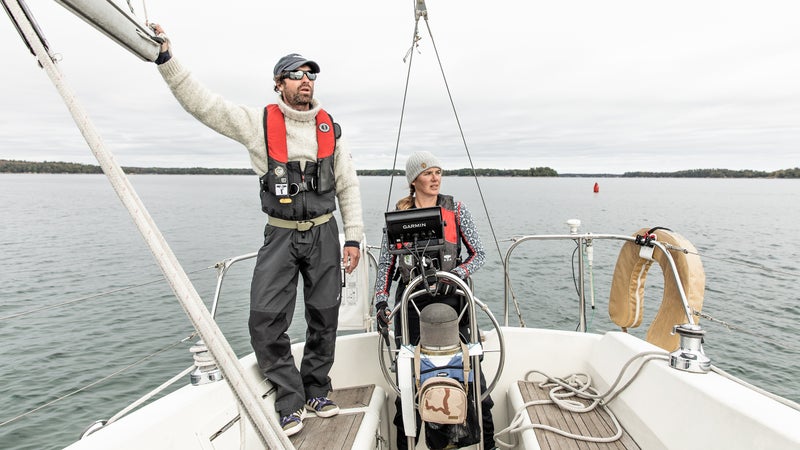
Boston’s is a busy working harbor, so to avoid the traffic we sailed straight out to sea. A soggy purple finch plopped on deck, had a look down below, then took a nap, head under wing, nestled against Will’s foot. We were grateful for the radar, as heavy fog meant we couldn’t see much beyond �ҴǴDz���’s bow. But, preoccupied with making sure our guest had enough crackers, we forgot the number one rule of sailing (always keep a lookout) and the number one rule of radar (remember to zoom out after you zoom in).
“Oh, there’s a tug,” I said to Will.
“Shit,” was his reply.
A second boat loomed out of the fog behind the tug. “It’s towing a barge—they’re moving toward us,” Will said. He was alarmed. “Tack. ���Ƿ�!” he yelled. I swung Goose around, and we sailed back the direction we had come. The wind and waves were picking up. It was raining sideways.
Entering unfamiliar harbors can be dodgy; enter in the dark during a storm and it’s downright scary. But cold and tired, we beat doggedly toward Gloucester. We couldn’t see Norman’s Woe, the fabled site of many shipwrecks to the southwest of the harbor, but there was a faint blinking light warning us to steer clear. We could barely make out the lobster pots until we were almost on top of them. There were hundreds, their malevolent little lines ready to wrap around any propeller that came too close. Our new spotlight didn’t work. We rounded the break wall and picked up the first mooring we came across. I tried to hail the yacht club it belonged to on the radio, but there was no answer. Closed for winter. We cooked two boxes of macaroni and cheese, devoured it in heaping, steaming spoonfuls, and went to bed. It was a night of rolling and bucking, and not between the sheets. Like two corpses we lay, straining our ears to make sure that Goose was still tied to the mooring. The wind mocked us all.
He Said… “OK, I’ll Go to Sea Once More”
Heading north from Gloucester, most sailboats pass through the Blynman Canal to save time and avoid rounding the shipwrecked waters off Cape Ann. Unsure about our clearance under a bridge, we opted for the cape and endured cold rain, massive North Atlantic swells—and, for me, seasickness. Claire somehow managed without nausea, but the only time I didn’t think I was about to vomit was at the helm, my eyes trained on the horizon.
We made Newburyport that afternoon and tied up at the town dock. Claire bought us a pair of wool hats, and we had a pizza delivered to the boat. We were about 90 nautical miles, or three days’ sail, from Lower Goose Island. A heavy gale was forecast to hit in 48 hours and would require us to lay over in Kittery, Maine, for a day. That put us into Casco Bay, where we planned to dock the boat for the winter and fly home, on October 7. That last day, just about nightfall, we would pass Lower Goose Island, four miles to starboard.
As planned, we stayed in Kittery, shed our foul-weather gear, and let the gale blow through. On the morning of October 6, we began the last leg of our journey. But before tacking north, we decided to follow the advice of a man in the next slip over and go look for whales beyond a rocky archipelago known as the Isles of Shoals. We were about six miles offshore. Broad swells like soft prairie hills rolled by in wide sets, but a faint wind hardly marred the ocean’s surface. Under a cloudless sky, we glassed the blue horizon fruitlessly for water spouts, humped backs, and flukes. Finally, we gave up, but as we turned north for Kennebunkport, our last night’s destination, we glimpsed a large kettle of seabirds circling low over the water.
Gannets, cormorants, and gulls were diving for baitfish that scattered in nervous schools. A pod of porpoises, apparently leaving the feeding frenzy, passed as we cut the motor, hoisted the sails, and very slowly drifted into the mass of activity. We’re bound to see a whale here, I said as the porpoises disappeared to the south. But rather than a whale, Claire noticed a lobster boat bearing down from a mile away. Its pointed hull showed as two symmetrical triangles, meaning that it was headed directly for us.
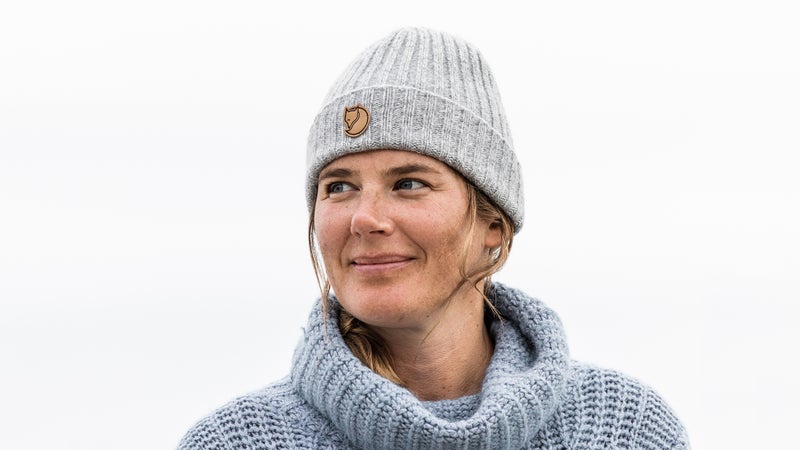
Claire raised both her arms, waving and cursing vigorously. “What are they thinking?” she asked. With every passing second, it became clear that the boat was not changing course, even as Claire yelled and flagged her arms with increasing agitation.
Finally, she cranked the motor, I jammed it into gear, and Lower Goose lurched forward with a cough of black smoke. The lobster boat roared by us with no one at the helm. The two men on board, both working aft while underway, briefly lifted their heads to notice the sailboat they’d nearly halved abeam on the open ocean.
“Those irresponsible fuckers,” Claire said as the lobster boat faded toward shore. “Time to go to Kennebunkport,” I said, and we set a course a few degrees east of north for our final port of call.
By now, Claire and I had our routine dialed. No other aspect of our life together required the communication or cooperation of managing the boat. Claire was the captain, I the mate. We worked together. We solved our problems—not the kind that send flat-footed couples to therapy, but the kind that require someone on deck and someone aloft, someone to tie in the reef lines and someone to steer the boat head to wind. We relied on each other. I wasn’t ready to sell the horses and buy our dog a life jacket, but the experience further convinced us that we could spend our lives together—on land and sea.
She Said… “We’ll Sail Around the World”
We’d planned to hoist our Jolly Roger when we got close to Casco Bay, but things didn’t go as planned.
As we left Kennebunkport, the wind was again from the north, and with 35 nautical miles to go we turned on the engine. But Goose kept decelerating. Will went below to assess the situation and reappeared on deck followed by a puff of smoke. The old engine had suffered from years of disuse. The sails slumped, we had no headway, and the swells rocked us like a pendulum. We can sail out of this, we said. Then, as we drifted toward the restricted presidential waters of the Bush compound, we weren’t able to sail out of it. I called Boat U.S., a tow company. For two hours, we clung by a dock line to a lobster pot and were sad.
A chipper little tow boat and John, her deaf-in-one-ear captain, showed up for the rescue and dragged us for the next seven hours. There was a lot of time to reflect. I felt gratitude to those who had helped make this voyage happen—Will, my parents, Max, and so many others. I realized that while Goose might not be the most comfortable boat, she sure was comforting. I understood why, all those years ago, my parents chose boats: for the freedom.
Will and I were both on deck entering Casco Bay. I told him the names of the passing islands: Chebeague, Bustins, the Goslings, Upper Goose, Lower Goose. And then, there on the dock at Strouts Point in South Freeport, having left Connecticut five hours earlier by car, were my parents and my brother. I handed the bow line to my father. Mum patted Goose, as one relieved mother would greet another, and we all ate fried shrimp at Harraseeket Lunch and Lobster. Will and I chose to spend the night on the boat. James joined us. “Does she always smell this bad?” he asked from his bunk.
The next few days were spent getting Goose ready for winter. I wanted nothing to do with society. My thoughts strayed to our next project: the house we’re planning to build. A few days after Will got back from Kyrgyzstan, we had purchased a plot of raw land in Santa Fe. While folding sails, I imagined our bedroom, small and cozy like a ship’s berth, and decided we should have an office each, at opposite ends of the house.
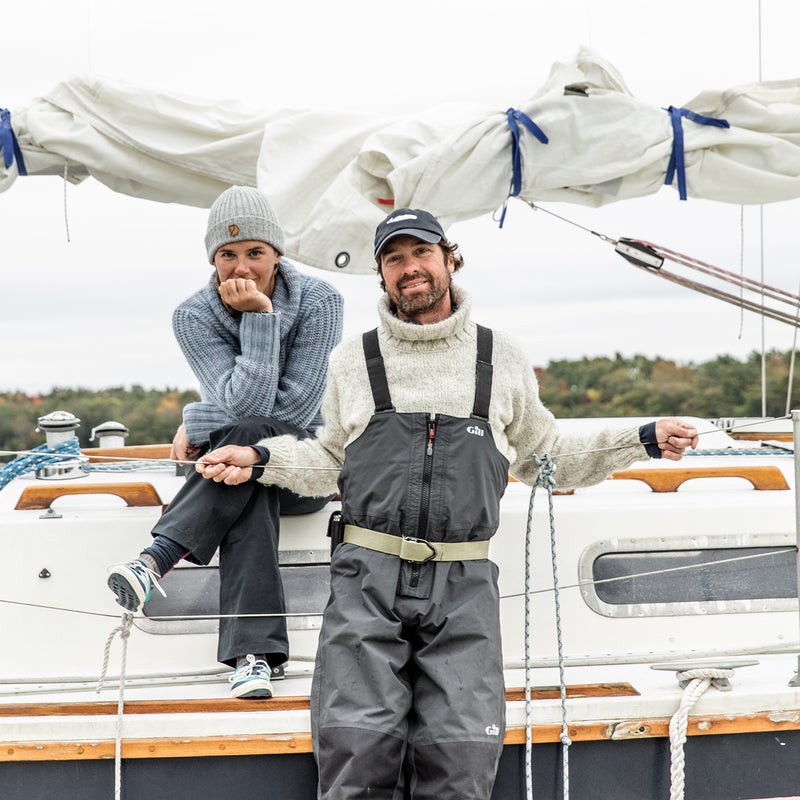
Will interrupted my reverie: “I think we should keep sailing north next summer.”
“Yep,” I said.
He continued: “We should definitely go to Canada.”
Wait, what? I’d just spent two weeks shivering, damp, and cold. “What happened to the more southern climes?” I replied.
Will was moving around Goose with the same ease he moves around a horse. He said, “We’ll get there eventually.”
Claire Antoszewski was an intern at ���ϳԹ��� in 2002; she now works as a physician assistant in emergency medicine. Will Grant () is writing a book based on his October 2017 story about the Pony Express trail.



